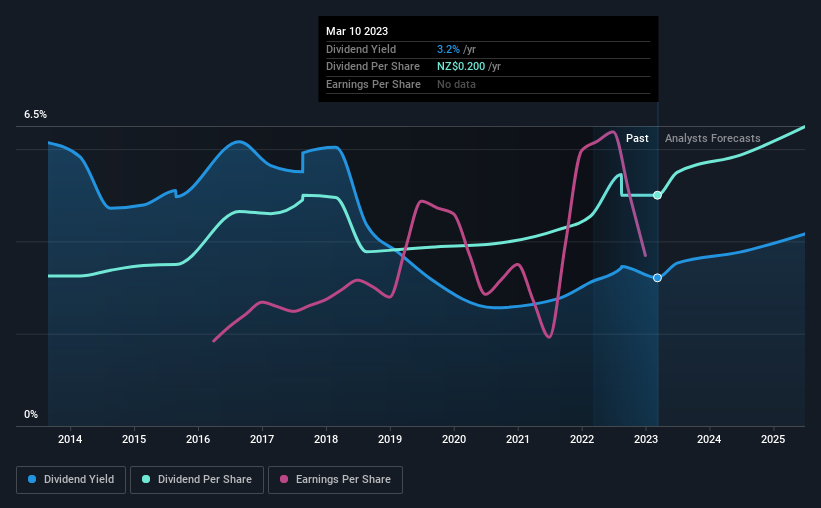We Wouldn't Be Too Quick To Buy Mercury NZ Limited (NZSE:MCY) Before It Goes Ex-Dividend
Some investors rely on dividends for growing their wealth, and if you're one of those dividend sleuths, you might be intrigued to know that Mercury NZ Limited (NZSE:MCY) is about to go ex-dividend in just four days. The ex-dividend date is one business day before the record date, which is the cut-off date for shareholders to be present on the company's books to be eligible for a dividend payment. The ex-dividend date is important as the process of settlement involves two full business days. So if you miss that date, you would not show up on the company's books on the record date. This means that investors who purchase Mercury NZ's shares on or after the 15th of March will not receive the dividend, which will be paid on the 3rd of April.
The company's upcoming dividend is NZ$0.10 a share, following on from the last 12 months, when the company distributed a total of NZ$0.20 per share to shareholders. Calculating the last year's worth of payments shows that Mercury NZ has a trailing yield of 3.2% on the current share price of NZ$6.25. Dividends are an important source of income to many shareholders, but the health of the business is crucial to maintaining those dividends. As a result, readers should always check whether Mercury NZ has been able to grow its dividends, or if the dividend might be cut.
View our latest analysis for Mercury NZ
Dividends are typically paid from company earnings. If a company pays more in dividends than it earned in profit, then the dividend could be unsustainable. Last year Mercury NZ paid out 104% of its profits as dividends to shareholders, suggesting the dividend is not well covered by earnings. Yet cash flow is typically more important than profit for assessing dividend sustainability, so we should always check if the company generated enough cash to afford its dividend. Over the last year it paid out 57% of its free cash flow as dividends, within the usual range for most companies.
It's disappointing to see that the dividend was not covered by profits, but cash is more important from a dividend sustainability perspective, and Mercury NZ fortunately did generate enough cash to fund its dividend. If executives were to continue paying more in dividends than the company reported in profits, we'd view this as a warning sign. Extraordinarily few companies are capable of persistently paying a dividend that is greater than their profits.
Click here to see the company's payout ratio, plus analyst estimates of its future dividends.
Have Earnings And Dividends Been Growing?
Stocks in companies that generate sustainable earnings growth often make the best dividend prospects, as it is easier to lift the dividend when earnings are rising. If earnings decline and the company is forced to cut its dividend, investors could watch the value of their investment go up in smoke. This is why it's a relief to see Mercury NZ earnings per share are up 8.0% per annum over the last five years.
The main way most investors will assess a company's dividend prospects is by checking the historical rate of dividend growth. In the last nine years, Mercury NZ has lifted its dividend by approximately 4.9% a year on average. It's encouraging to see the company lifting dividends while earnings are growing, suggesting at least some corporate interest in rewarding shareholders.
Final Takeaway
Is Mercury NZ worth buying for its dividend? Earnings per share have not grown all that much, and the company is paying out an uncomfortably high percentage of its income. Fortunately it paid out a lower percentage of its cash flow. It's not the most attractive proposition from a dividend perspective, and we'd probably give this one a miss for now.
With that in mind though, if the poor dividend characteristics of Mercury NZ don't faze you, it's worth being mindful of the risks involved with this business. Our analysis shows 3 warning signs for Mercury NZ that we strongly recommend you have a look at before investing in the company.
Generally, we wouldn't recommend just buying the first dividend stock you see. Here's a curated list of interesting stocks that are strong dividend payers.
Have feedback on this article? Concerned about the content? Get in touch with us directly. Alternatively, email editorial-team (at) simplywallst.com.
This article by Simply Wall St is general in nature. We provide commentary based on historical data and analyst forecasts only using an unbiased methodology and our articles are not intended to be financial advice. It does not constitute a recommendation to buy or sell any stock, and does not take account of your objectives, or your financial situation. We aim to bring you long-term focused analysis driven by fundamental data. Note that our analysis may not factor in the latest price-sensitive company announcements or qualitative material. Simply Wall St has no position in any stocks mentioned.
Join A Paid User Research Session
You’ll receive a US$30 Amazon Gift card for 1 hour of your time while helping us build better investing tools for the individual investors like yourself. Sign up here

